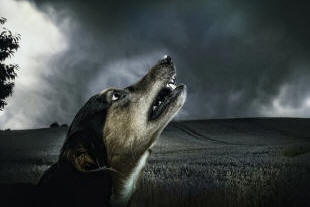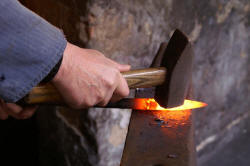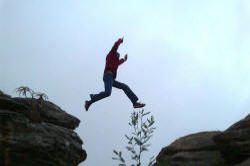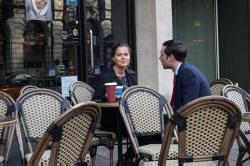Relative pronoun clauses: the essentials
 |
What is a relative clause?The dog which howled all night |
Relative clauses are a way to define or add information to a noun in a
sentence.
So, for example, in
The dog which howled all night and kept me awake
The noun, dog, is rendered unique among millions of dogs
because only this one howled and caused me a sleepless night. The
pronoun which refers back to the noun dog and dog
is the subject of the verb howl (the dog howled).
We can make the same idea in English with two sentences like this:
- The dog howled all night
- The dog kept me awake
but it is easier and clearer to use a relative pronoun to link the ideas.
Sometimes you will see relative pronoun clauses described as adjective clauses and that is a defensible point of view because they modify and describe the noun in some way. We will remain here with the usual terminology for these things.
Here is another example of a slightly different sort of relative clause:
The White House, that stands on Pennsylvania
Avenue, is a huge building
Here, too, we can make two sentences:
- The White House stands on Pennsylvania Avenue
- The White House is a huge building
The situation is slightly different because we already know that The
White House is unique (it's the name of a particular building) so the fact that it
stands on Pennsylvania Avenue is
just extra information. The fact that it stands there does
not define the building, it just adds data.
Look where the commas appear
and you will see that the clause is divided from the rest of the
sentence.
That's important, as we shall see.
 |
Forming a simple relative clause sentence |
There are rules for forming relative clauses in English and some are quite complicated. The simplest way is like this.
Start with two simple sentences:
The lucky children came to the party
and
The children enjoyed themselves
Now identify the subjects of the sentences.
In the first sentence, the subject is the lucky children.
In the second sentence, it is just the children.
Do the following conversion:
- Place the second clause after the first noun phrase in the
first sentence.
That gives us:
The lucky children the children came to the party enjoyed themselves - Now delete the second noun phrase:
The lucky children the children came to the party enjoyed themselves - Now replace it with the appropriate relative pronoun, in
this case who because the reference is to people.
That then gives us:
The lucky children who came to the party enjoyed themselves
 |
To see how this is explained in a lesson for learners, watch this short video. |
The same simple procedure can be repeated to produce a range of relative clause structures. Like this
| This | + | this | → | this | → | this |
| The house was Mrs Brown's | The house was sold | The house the house was sold was Mrs Brown's | The house the house which was sold was Mrs Brown's | |||
| I gave the tickets to the man | The man was on the door | I gave the tickets to the man the man was on the door | I gave the tickets to the man the man who was on the door | |||
| I watched the programme about snakes | The programme was on last night | I watched the programme about snakes the programme was on last night | I watched the programme about snakes the programme that was on last night |
It is easy but this will not work for all relative pronoun clauses. It is, however, a good place to start when teaching the area because many learners' first languages either work very differently or have no relative clause structures at all.
 |
Five types of clause |
We mainly use these five pronouns to make relative clauses
| pronoun | use | examples |
| who | subject or object pronoun for people | The students who had the party are now living over there. |
| which | subject or object pronoun for animals and things |
|
| referring to a whole clause or previously mentioned idea (only which can do this) | They fell in love and got married the following month which surprised everyone. | |
| whom | object pronoun only for people (formal) | Melissa, whom I met at the party, invited me. |
| whose | possession | Do you know the man whose car is parked on the corner? |
| that | subject or object pronoun for people, animals and things (who or which are also possible) |
|
 |
 |
Defining and non-defining relative clauses |
Here are four sentences to compare:
What's the difference in meaning between these pairs of sentences?
Try saying the sentences aloud to get a feel for the meaning.
Click
here when you have an answer.
- At the first meeting, which was held yesterday, the chair invited comments from everyone.
- At the first meeting which was held yesterday the chair invited comments from everyone.
- The kids, who came with me, had lunch on the train.
- The kids who came with me had lunch on the train.
- Sentence 1
- contains a non-defining relative
clause. The fact that the meeting was held
yesterday is additional information which can be ignored
because the sentence makes sense without it.
We can put the relative clause in brackets with no change in meaning: At the first meeting (which was held yesterday) the chair invited comments from everyone. - Sentence 2
- contains a defining relative clause. We are only talking about the first meeting which was held yesterday. Other meetings were held yesterday but we are only concerned with the first of these.
- Sentence 3
- contains a non-defining relative clause. The only kids in question are those who came with me. All the kids had lunch on the train and the extra information that they came with me is additional (and it could appear in brackets, like this).
- Sentence 4
- contains a defining relative clause. There were other kids (who came alone or with someone else) who had no lunch / had lunch somewhere else. I only know that the kids who came with me had lunch.
Now look at these four sentences.
| Sentence | Comment |
| The Statue of Liberty, which stands in New York, is well known. | The clause which stands in New York
is between the commas because it is
simply adding information concerning the location of
something known to us all. There is only one Statue of Liberty so we do not need to define it. |
| The Statue of Liberty which stands in New York is well known. | There is only one such statue so to omit the commas would be wrong. You cannot define that which is already unique. |
| The statue of Gandhi which stands in Tavistock Square is well known. | There are many statues of Gandhi around the world so to define a particular one by where it is acceptable. |
| The statue of Gandhi, which stands in Tavistock Square, is well known. | This is also acceptable. Here we are talking about a statue of Gandhi but adding information to say where it is, not defining it. |
In speech, of course, we do not have punctuation to help our understanding. However, we still make a difference between defining and non-defining relative clauses in the way we phrase a sentence. It works like this:
- A defining relative clause has the subject plus
the relative clause as the subject of the verb so we say it like
this:
The children who came with me || had lunch
and that means only the children who came with me had lunch (and some, by implication, did not). - A non-defining relative clause just adds information (and
the clause could be put in brackets) so we break up the sentence
differently, like this:
The children || who came with me || had lunch
and that means all the children came with me and they all had lunch.
 |
Subject or Object? |
It's important to know whether the relative pronoun is acting as the
subject or the object of the verb.
The subject of a verb is the person or thing that does the action.
The object of the verb is the person or thing that receives the
action.
Like this:
| Subject | Verb | Object |
| The horse | threw | the rider |
| Mary | made | soup |
What's the relative pronoun doing in the
following examples? Look at the
underlined clauses and decide if they refer to the subject or
object of the verb phrase.
Click
when you have an answer.
- The man who bought the tickets really is just being generous
- The tickets, which hopefully will allow us entry, are very welcome
- The man that we thanked seemed genuinely surprised
- The tickets which he bought were quite expensive
- Only the senior doorman, who we gave the tickets to, noticed that they were fakes
Here are the answers:
-
The man who bought the tickets really is just being generous
– subject – the pronoun who is followed by
verb phrase (bought) and the object (the tickets)
We can rephrase the first part of the sentence as
The man bought the tickets (Subject – Verb – Object) - The tickets, which hopefully will allow us entry, are very
welcome – subject again – which is followed by the
verb phrase will allow), its object (us) and
its pre-modifying adverb (hopefully)
We can rephrase the first part of the sentence as
The tickets will hopefully allow us entry (Subject – Verb – Object) - The man that we thanked seemed genuinely surprised – object
– that is the object of we thanked
We can rephrase the first part of the sentence as
We thanked the man (Subject – Verb – Object) - The tickets which he bought were quite expensive –
object – which
is the object of he bought
We can rephrase the first part of the sentence as
He bought the tickets (Subject – Verb – Object) - Only
the senior doorman, who we gave the tickets to, noticed
that they were fakes – indirect object after preposition to
We can rephrase the first part of the sentence as
We gave the tickets to the senior doorman (Subject – Verb – Direct Object – Indirect Object)
A simple rule to tell students is:
- If the relative pronoun is followed directly by a verb phrase
with or without a modifying adverbial, it’s the
subject.
So, in The man who just bought the car, the relative pronoun, who, is followed directly by the pre-modified verb phrase, bought. This means that the relative pronoun stands for the subject of the verb. - If the pronoun is not followed by a verb phrase (but by a noun
phrase or pronoun) it is the object.
So, in The book which she bought was a first edition, the relative pronoun, which, is followed by a pronoun, she, so it cannot be the subject of the verb. The relative pronoun stands for the object of the verb.
 |
Omitting the pronoun |
Sometimes, we can leave out the pronoun altogether so instead
of:
The house which he bought
we can have:
The house he bought
and instead of:
The woman who(m) you saw in Margate
we can have
The woman you saw in Margate
In which of these sentences can you omit the relative pronoun?
- The book which I read yesterday is on the shelf
- The man who gave you the money is very generous
- The children who came late were punished
- The water which he drank made him unwell
- The spider, which he killed, was quite harmless
Can you see what the rule is?
Click
here
when you have an answer.
In Sentences b, c and e we cannot
leave out the pronoun because that makes unacceptable sentences:
*The man gave you the money is
very generous
*The children came late were punished
*The spider, he killed, was quite harmless
In sentences a and d we can leave out the pronoun and
make acceptable sentences:
The book I read yesterday is on the shelf
The water he drank made him unwell
 |
If the relative pronoun refers to the subject of the verb we must use it. |
In sentences b and c, the
relative pronoun is the subject of the verb because we can
rephrase them like this:
The man gave you the
money
The children came late
and we cannot omit the relative pronoun because that leaves
the unacceptable:
*The man gave you the money is very generous
and
*The children came late were punished
 |
If the relative pronoun refers to the object of the verb we can omit it ... |
In sentences a and d, the
relative pronoun is the object of the verb
because we can rephrase them like this:
I read the book
The man drank the water
so, leaving out the relative pronoun and arriving
at
The book I read yesterday is on the
shelf
and
The water he drank made him unwell
is acceptable.
 |
... but only in defining relative clauses |
In sentence e, we have
commas after the spider and killed. We know that
it is a non-defining relative clause and the commas could be
replaced by brackets with the same meaning:
The spider (which he killed) was quite harmless
We cannot omit the relative pronoun because that leaves us
with the unacceptable:
*The spider, he killed, was quite
harmless
 |
We can never omit whose |
We can have:
The man whose tickets we stole
but not
*The man tickets we stole
 |
Using that |
| The man that she met |
We can replace who, whom and which with the pronoun that in many cases but there is a rule here, too.
In which of these sentences can that be used as the
relative pronoun instead of who, whom or which?
What's
the rule? Click
here when you have an answer.
- The table, which was too expensive for me anyway, had been sold
- The bus which I took to the game was 10 minutes late
- The man who(m) she married was quite rich
- Mary, who is Fred's sister, is a concert pianist
In sentences b and c we can replace which
and who(m) with that, so we have the sentences:
The bus that I took to the game was 10 minutes late
The man that she married was quite rich
In sentences a and d, be cannot use that because we get:
*The table, that was too expensive for me anyway, had
been sold
*Mary, that is Fred's sister, is a concert pianist
The rule is:
The pronoun that can
only be used in
defining relative clauses and then it’s more informal.
(Some people might accept using that for the table in
a non-defining clause but it is clumsy and often unacceptable to do so.)
There is a lot more to learn about relative clauses but at the initial stage of a teaching career, this is plenty. It's a complicated area and needs careful handling.
| Related guides | |
| the in-service guide | this is a more technical guide which includes all of this and much more |
| relative adverbs | for more on another form of relative clause using adverbs |
Click for a test in this area.
